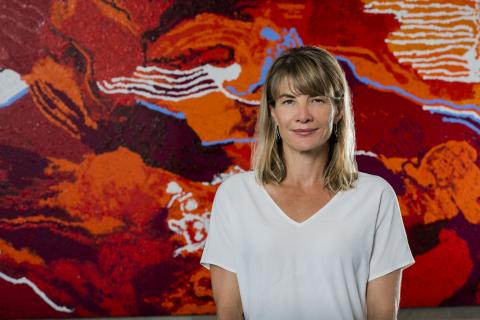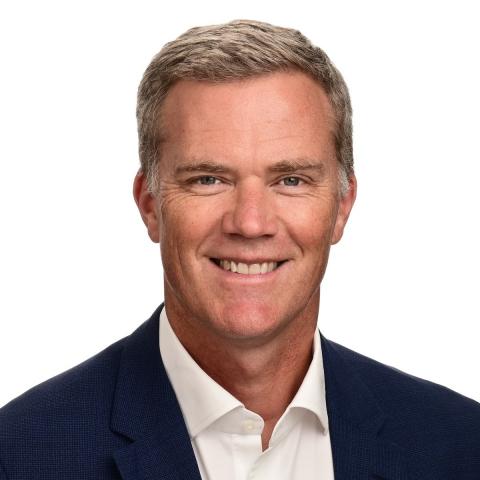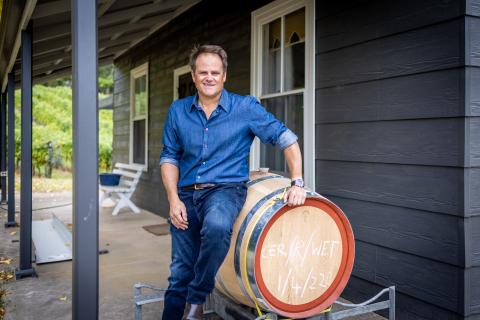
Three distinguished Bond University alumni shared their insights on the future of technology, energy, and investment during the Bond Business Leaders' Forum.
The speakers were David Baxby, Co-Founder of Coogee Capital and former Co-CEO of the Virgin Group; Kate Vidgen, Senior Managing Director at Macquarie's Green Investment Group; and Antony Ceravolo, Director of the Ceravolo Group and founder of LOVEFiLM and Sine.
Here are some of the standout moments from their discussion.
MY KINGDOM FOR A WORKER
David Baxby says a pincer movement of high commodity prices and a drop in skilled migration makes it impossible to fill some roles.
“At the moment we’ve got 12,000 contractors working for us in 43 offices around the country and we currently have 1000 positions that pay on average $200,000 a year that we can't fill.
“(Those vacancies) are everything from skilled tradespeople all the way up to mining engineers and white collar professionals.
“Part of it is caused by Australia being in a sweet spot in terms of the commodity cycle, but we’re also missing 650,000 skilled migrants over the last three years.”
TRANSITION IS THE NEW GREEN
Kate Vidgen says Australia risks being left behind in the energy transition but could be leveraging its competitive advantages.
“We're seeing two streams globally. One is the ‘stick’ stream, and you're seeing that in Europe where policies like the Renewable Energy Directive II set up a whole range of mandates that have to be complied with between now and 2030 and is driving things like the production of sustainable aviation fuel and uptake of electric vehicles.
“Elsewhere in the world there's a ‘carrot’ approach and the US is probably the best example.
“Last year the US did something pretty phenomenal - they introduced the Inflation Reduction Act, and on its face it is about clean energy.
“However its really about re-industrialising the US with a range of incentives to onshore upstream manufacturing.
“Australia, unfortunately, has neither. We do have some emerging requirements under the new climate change legislation and a growing pool of direct subsidy.
“For example Deloittes came out this week and said if we wanted to have a true hydrogen industry, we had to spend $15.5 billion over 10 years.
“So Australia is in a little bit of a difficult situation.
“But what do we have is one of the best renewable resources in the world. We have a strong mining industry which gives us a huge amount of expertise.
“The policy settings aren't quite there yet, but thinking about our competitive advantages, we could do well.”
UNDERDOG TURNS TECH LEADER
Antony Ceravolo says international technology giants are waking up to Australia’s expertise.
“We've got the access to capital, we've got the smartest people in the room because they come from Bond or some of the other universities.
“And I think more importantly, we've got the drive and the willingness to show the global audience what we can achieve. That underdog spirit is very important in software and technology land: being able to tap into getting that little bit extra from your team, and being able to project yourself on the world stage.
“I think we're getting a lot better at pitching to US venture capitalists or pitching to customers, and making it very clear that Australia is a great place to build a technology hardware business.
“Technology as a percentage of GDP is still not a huge amount but global organisations like Amazon and Honeywell are looking at Australia in terms of its stable workforce, stable rule of law, a stable economy, and a great time zone.”

SURVIVAL OF THE FITTEST
David Baxby says higher interest rates have raised the bar for businesses seeking to tap equity markets.
“Clearly the market has shifted. Investors are more opportunistic and that's principally driven by the fact that interest rates are now four times higher than they were 18 months ago. The ability to put money in a bank at zero risk for 5 percent now exists.
“So that just means that the bar for the business plan steps up.
“In certain sectors there are still quite compelling transactions to be done and capital to be sourced. But I think a lot of the sectors where it's a bit of a marginal product - doesn't really have a lot of differentiation - those businesses aren't going to survive the next two or three years.
“But in the areas that we've been talking about - whether it be process automation, AI - where it's increasing the productivity of workforce, I think there's an enormous amount to come.
“I am incredibly bullish for what I think is going to be the future for Australia if we can get immigration sorted.”
RISK IT FOR THE BISCUIT
Antony Ceravolo says Australia needs to incentivise risk to support entrepreneurship.
“The one big difference between Australia and the UK is our taxation and the way we deal with risk and entrepreneurialism.
“If you set up a company in the UK, the capital gains concessions and the reward you get for taking founder risk is pretty good. Sometimes it can be 10 percent.
“When you’re a founder putting your own money into business and taking real hard cash risk, these things really matter.
“So I think whatever we can do politically here to try and incentivize our future governments to really understand capital gains and risk structures … we've been talking about that for 10 years, and it's not changing in Australia.”
ENERY SECURITY BLANKET
Kate Vidgen says China is investing in hydrogen production to improve energy security, while Australia has potential for low-cost hydrogen production to feed onshore industry.
“China is deploying electrolysers at scale.
“You're seeing hundreds of megawatts being deployed, but the forecast this year is two gigawatts in China. And what's that about? It's about energy security.
“Ninety percent of China’s oil and gas is imported, so in a geopolitically tense situation, they are very vulnerable.
“They have some great wind and solar resource and they recognise hydrogen can to fill the gap.
“There are some places in Australia where it will make sense to produce very low cost hydrogen. One of them is the Pilbara. Another is the Northern Territory.
“But we are not like Europe. We don't have a base source of demand, we don't have big industry that can set us up to have hydrogen at scale. So that is a bit challenging.
“I do wonder whether there are alternatives or additions to a hydrogen export industry.
“It may be a lot smarter, particularly if you automate and do modular design for steelmaking plants, to undertake increased processing in Australia.
“My guess is there'll be a lot more onshoring of industry to where electricity is cheap, rather than exporting electricity to where current manufacturing is happening. And that's a great opportunity for us.”
FROM PJAMAS TO PANTSUITS
David Baxby says returning to the office has seen a 30 percent increase in productivity, and for some junior employees it’s a ‘life changer’.
“I think (working from home) works incredibly well for senior people who know what they're doing.
“But I'll never forget that first 10 years that I had at Goldman Sachs sitting on a desk with a phone and a computer and having everything going on around me.
“I think humans are naturally social creatures and we learn by example. I think we all love working in small team environments.
“And so I think the flexibility of say, a Monday and Friday from home where you've got fairly deeply analytical thinking time to do that work, I can see that going forward.
“We brought everyone back to the office three months ago and we've seen productivity as measured by phone calls, sales emails, however you want to measure it, go up by 30 percent.
“I had some very productive, very successful, fairly junior people come up to me recently saying (coming back to the office has) been a life changer, I feel like a weight has been lifted off my shoulders.”

RISE OF THE MACHINES
Antony Ceravolo says AI system like Chat GPT are ‘going to get smarter, really quickly’.
“If you're running a support desk, or you're running an offshore call centre, I think that's going to be the industries where AI is really going to have an impact in the next 12 to 18 months.
“There’s been a lot of talk about ChatGPT and cheating on university assignments. But the thing that's happening is ChatGPT has been turned upon itself, where it can detect whether or not an assignment or essay is being generated by ChatGPT. So we're going through the next 12 months of flushing this technology out and seeing what it can really do.”
FLAT HIERARCHIES AND SMALL TEAMS
David Baxby says middle management is dead.
“I think that with the adoption of technology, flexible workplaces, small teams … it means anyone in middle management is in real trouble.
“They’re the ones that are getting cleaned out in businesses like Twitter. And I think that's good for people who are coming into the workforce because they'll be working with very, very senior people and the magnifying glass will be on them a lot earlier.
“I think that's really exciting - maybe not if you’re a middle manager.”
KEEP YOUR OPTIONS OPEN
Kate Vidgen has advice for the latest cohort of graduating Bondies.
“I spent a lot of time in commodities, and commodities are all about options and valuing optionality
“Just take every single option you can get because very rarely do not get something out of it. If you don't move and you don't change, you don't get anywhere.”